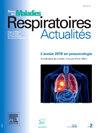非小细胞肺癌(BRAF, MET, HER2)
Q4 Medicine
引用次数: 0
摘要
非小细胞肺癌(NSCLC)的预后已经显著改善,因为发现了致癌驱动改变和实施靶向治疗,如酪氨酸激酶抑制剂,抗体药物偶联物或双特异性抗体。如今,在非鳞状NSCLC患者开始治疗之前,无论其吸烟状况如何,以及在很少或不吸烟的鳞状NSCLC患者中,组织样本和液体活检都是至关重要的,尽管它们缺乏敏感性,但野生分子谱分析,最好是使用下一代测序面板。在这篇综述中,我们将介绍一些罕见的分子改变,BRAF, MET和HER2的最新证据,并不断创新。即使这些新药中有许多还没有在欧洲获得资助,临床试验的登记可以让我们的病人从创新治疗中受益,并产生数据。重复样本的转化研究项目对于探索对这些新药的耐药性机制也很重要。本文章由计算机程序翻译,如有差异,请以英文原文为准。
Cancer bronchique non à petites cellules avec autres mutations actionnables (BRAF, MET, HER2)
Non-Small Cell Lung Cancer (NSCLC) outcomes has been significantly improved since the discovery of oncogenic driver alterations and implementation of targeted therapies such as tyrosine kinase inhibitors, antibody drug conjugates or bispecific antibodies. Nowadays, wild molecular profiling, preferably with next-generation sequencing panels is crucial before starting treatment in patients with non-squamous NSCLC regardless of their smoking status, and in those with squamous NSCLC who are little or non-smokers, on tissue samples but also liquid biopsies that can tremendously helpful despite their lack of sensitivity. In this review, we will present the latest evidence on some rare molecular alterations, BRAF, MET and HER2, with constant innovation pipeline. Even if many of these new drugs are still not funded in Europe, clinical trials enrollment allows our patients to benefit from innovative treatments and generate data. Translational research programs with repeat samples are also important to explore mechanisms of resistance to these new drugs.
求助全文
通过发布文献求助,成功后即可免费获取论文全文。
去求助
来源期刊

Revue des Maladies Respiratoires Actualites
Medicine-Pulmonary and Respiratory Medicine
CiteScore
0.10
自引率
0.00%
发文量
671
 求助内容:
求助内容: 应助结果提醒方式:
应助结果提醒方式:


